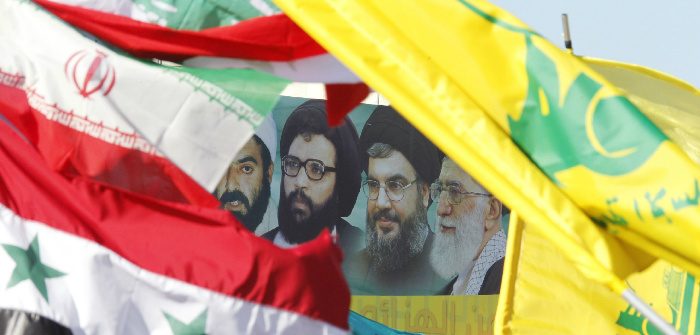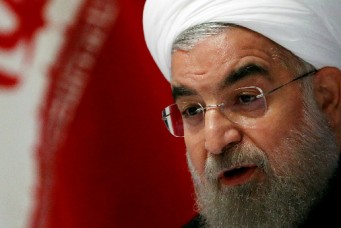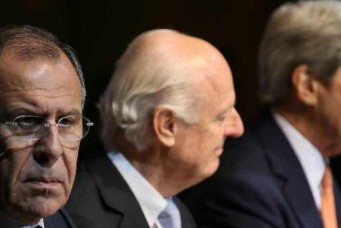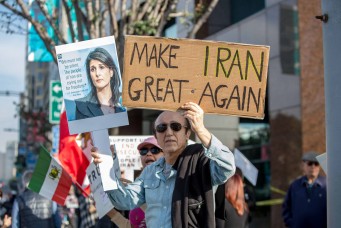Iran Is a Paper Tiger
From Riyadh to Washington, international leaders overestimate the power of the Islamic Republic of Iran.

A poster of Iran’s Supreme Leader Ayatollah Ali Khamenei alongside leaders of Lebanon’s Hezbollah, in Bint Jbeil, Lebanon, May 25, 2014. Ali Hashisho/Reuters
Judging by what appears in Western and Arab media, Iran controls at least half of the Middle East. Supposedly, its writ runs in Iraq, Syria, and in parts of Lebanon courtesy of Hezbollah, and it controls all anti-establishment forces in the Persian Gulf and its vicinity from Bahrain to Yemen. It is accused of wanting to resurrect the Persian Empire, create a “Shia Crescent,” or a combination of both. It has managed to establish a partnership with Moscow and close relations with China. Even its relations with Europe have been on the uptake after the signing of the Joint Comprehensive Plan of Action in July 2015, which tackled, for the time being, the Western alliance’s objections to Iran’s nuclear program.
Yet a close and impartial look at the balance sheet of Iran’s foreign policy will show that it actually has gained little in exchange for all the money and blood it has spent in its neighborhood. And in terms of its partnerships, it has received little from either Russia or China.
Take Iraq, for example. Whatever gains Iran might have made in influencing its historical rival to the west have been the consequence of the mistakes of the United States and Arab powers. It was only after being shunned by Arab governments that Iraq’s Shia majority government, under Prime Minister Nouri Al-Maliki, turned to Iran. Since Haider Al-Abadi became prime minister in September 2014, Iraq has effectively played Iran and Arab governments against one another. Iraq was only forced to turn to Iran when various Arab states, especially Saudi Arabia and Qatar, supported a range of extremist Sunni groups from Al-Qaeda in Iraq to the Islamic State, which Baghdad has spent years fighting.
Iraq has also kept its close ties with America, as illustrated by Al-Abadi’s visit to Washington in March. So far, Iraq has refused to recognize the 1975 Algiers Agreement that resolved the dispute with Iran over the Shatt Al-Arab waterways; declined to grant visa-free travel to Iranians although it gains significant economic benefits from Iranian pilgrims; and refused to cooperate on trying to limit sand storms that are choking Iran. This is not the behavior of a country under Iran’s thumb.
Although Iran has spent billions of dollars and many lives in Syria, President Bashar Al-Assad would have betrayed Iran if he had been offered a deal on the Golan Heights by Israel. And now Iran is forced to cede its place to Russia. Had Russia gained Western cooperation in reaching a deal on Syria, it would have done so, despite Iran’s objections. In fact, Russia has played up to Turkey in Syria. Only after President Recep Tayyip Erdoğan backtracked on demanding Al-Assad’s ouster did Russia again turn to Iran. Russia as always is using Iran as a bargaining chip vis-à-vis the West.
Nor has Iran gained much for its support of the Palestinian cause, despite the heavy cost that this support has had in terms of its relations with America and Israel. In 1980, Yasser Arafat supported Saddam Hussein against Iran. Hamas, too, has been tempted by money from Gulf Arab states and, lured by Turkey’s Erdoğan, has left Iran high and dry. Iran has gotten no thanks from Arabs for supporting the Palestinian cause. Rather, it has been accused of hindering peace. Thus far, only Hezbollah has remained loyal to Tehran.
In Yemen, a country flattened by Saudi Arabia, Iran is being held responsible for supporting and funding the rebellion against the government of President Abdu Rabbu Mansour Hadi, although there is little hard evidence that it has militarily supported them. Yet the Houthis are not Iran’s instruments. If the Houthis were offered a fair deal, most likely they would cut their ties to Iran.
On its eastern front, Iran has been forced to put up with the less-than-friendly behavior of Pakistan and Afghanistan. Both countries have allowed groups committing terrorist acts in Iran’s southeastern province of Sistan and Baluchistan to operate from their territories. Iran even helped the United States in Afghanistan in 2001, only to be included in the Axis of Evil. It has fought the Islamic State in Iraq and Syria (ISIS) while being branded the chief sponsor of terrorism.
Iran, despite its supposedly close relations with Russia and China, has not even been accepted as a full member of the Shanghai Cooperation Organization, while Pakistan will become a full member soon. This is because China put its full weight behind Pakistan’s admission, while Russia has hid behind Uzbekistan, which apparently opposes Iran’s membership, and has done little to get Iran accepted. Meanwhile, China has increased its investments in Pakistan and is developing the port at Gwadar as a rival to Iran’s Chabahar.
Hence the question: why has Iran pursued this counterproductive and self-damaging foreign policy? The main reason is that Iran, instead of having a national and realistic perspective on its foreign policy, has had an ideological approach. The Iranian leadership, especially the Supreme Leader Ali Khamenei and the Islamic Revolutionary Guard Corps, act more like an international Islamic movement than representatives of the Iranian state. They incur America’s and Israel’s wrath for supporting Palestinians and are sanctioned, while also being pilloried by Arab states, and being used as a doormat for Arab-Israeli reconciliation. Iran’s hardline leaders, who wield the real power, refuse to talk to America, undermining their own bargaining power vis-à-vis other actors and enabling Arab powers, Turkey, and others to use the pretext of the “Iranian threat” to advance their own regional ambitions and prevent American-Iranian reconciliation.
The administration of President Donald Trump has turned up the rhetoric against Tehran again. Iran cannot blame anyone except itself for its current predicament. But this is the ruthless game of international politics. If Iran does not look after its own national interests, nobody else will.
Shireen T. Hunter is a research professor at the School of Foreign Service, Georgetown University. She is the author of the new book God on Our Side: Religion and International Affairs.





